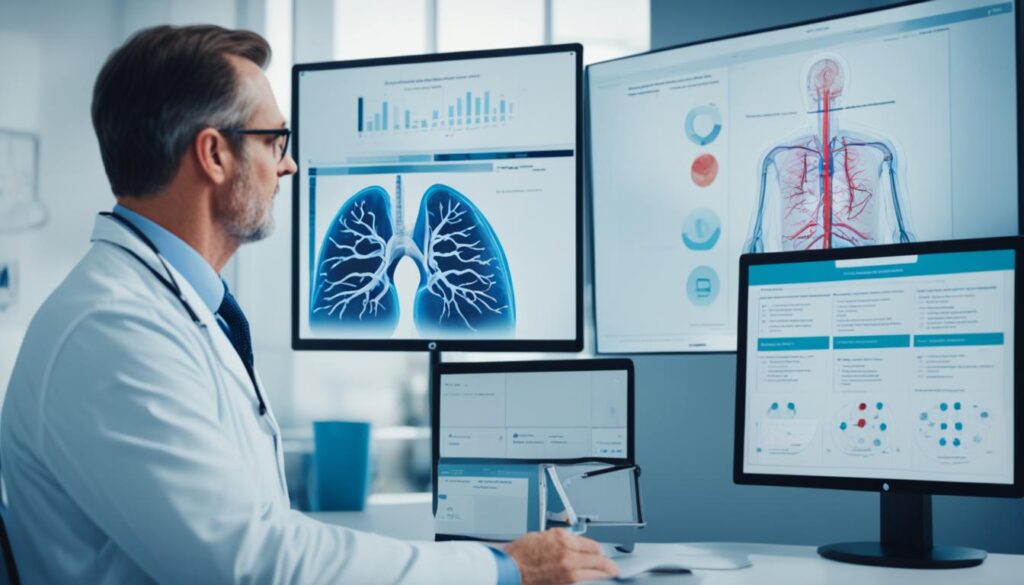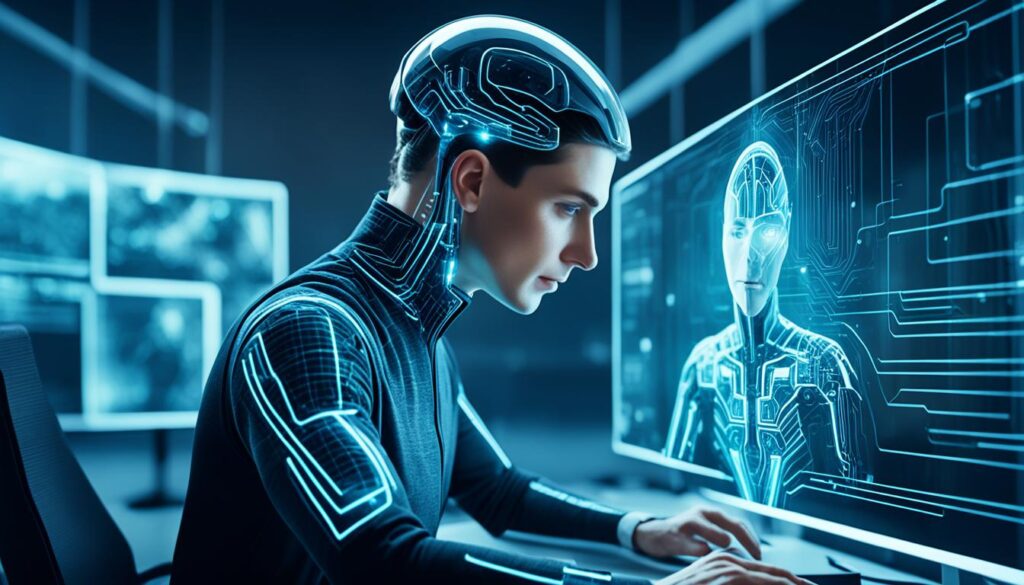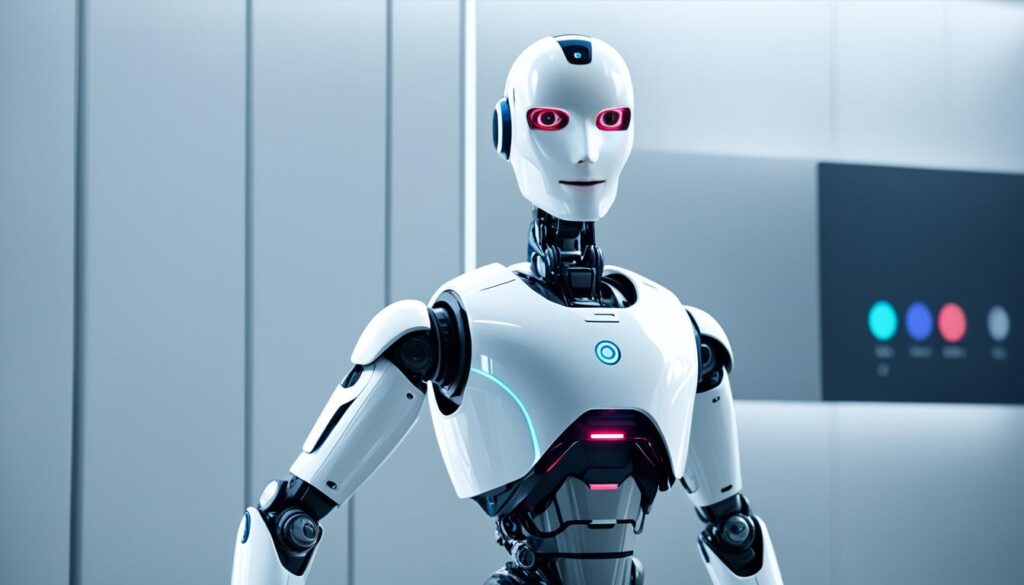Have you ever wondered how much artificial intelligence might change our world soon? It might be easy to think AI is just a fad. But, it is likely to change our lives as much as electricity or the steam engine did. The AI revolution is not far off—it’s happening now and will impact us more than you expect.
Thanks to natural language processing and machine learning, we now have AI like ChatGPT. These AI can understand and talk like us. This jump in technology means data is open to more people through many apps. With the potential of AI, we can solve tough problems and make our world better.
The AI Revolution: A Tipping Point Reached
Generative AI, such as ChatGPT, is changing the game in artificial intelligence. These models can create text, images, and other things that look human. This opens up tons of new uses for AI in business and elsewhere.
ChatGPT is especially good at talking with people. It feels like having a real conversation. This advancement has been a big deal, mixing new tech with what we really need.
ChatGPT and Generative AI Systems
Generative AI, with models like ChatGPT, is great for businesses and people. It can pull in lots of info and make sense of it in writing. This lets us make content faster, give better customer service, and improve our work in many ways.
Thanks to this tech, the way we use AI is changing. Voice assistants and content suggestions are getting smarter. They’re a bigger part of our everyday life, changing how we work and share information.
Technological Leaps and the “iPhone Moment” for AI
Tools like ChatGPT are having a huge impact, much like the iPhone did for phones. They’re changing how we see and use AI. This change is happening right now.
Today, we make more data in an hour than in a whole year twenty years back. But most of this data is not being used. Tools such as ChatGPT can help us use this data well. They let us find new ideas and solve problems better.
Now, we’re at a key moment in AI. This mix of smart tech, big data, and a need for automation is a big deal. Using AI cleverly can make a big difference for those ready to take the lead.
AI’s Transformative Impact on the Global Economy
Artificial intelligence is changing our world fast. It’s revolutionizing industries, increasing productivity, and growing the economy like never before. Thanks to AI, businesses can work smarter, making tasks easier and finding new ways to do things.
Boosting Productivity Across Industries
AI is boosting how much work companies can get done. It’s used in creating content, making software, marketing, sales, and helping customers. This technology helps automate tasks, make better decisions, and run more efficiently. This isn’t just good for companies; it also benefits people like us who use their products.
Projected Growth in AI Software, Hardware, and Services
The AI market is growing really quickly. Soon, money from AI software, hardware, and services will jump by a lot. By 2026, it could even hit $900 billion a year. This growth is because more businesses are realizing the big benefits AI can bring.
The power of AI goes beyond just these numbers. By 2030, AI might add over $15 trillion to the world economy. This is huge! It shows just how much AI can change our daily lives and the ways businesses work. As AI grows, so will its effect on our economy and how we live and work.
Geographical Winners: US and China Leading the Way
Two countries, the United States and China, are at the forefront of the AI revolution. They are likely to gain the most from AI economically. These nations are already major players with the world’s biggest economies. They have great technology, skilled people, and smart policies. This gives them an edge in using AI for growth and innovation.
The US has always been a leader in tech and is embracing AI quickly. Companies in the US, big ones in Silicon Valley and new startups, are investing a lot in AI. They have favorable laws, tons of data, and a spirit of creativity. This makes the US ready to use AI to make work better, form new fields, and grow the economy.
China is also racing ahead in AI. Its government sees AI as a top goal and has put in huge money for research. It also spurs businesses to join in. With a vast population, China has a lot of data, which is key for AI. Chinese businesses like Alibaba, Tencent, and Baidu are leading in making AI work in different areas, from online shopping to health care.
The role of China and North America in AI’s effect is huge. By 2030, it’s predicted that they will drive about 70% of AI’s global economic change. This shows how crucial these areas are for the world’s future economy. PwC thinks AI will push China’s economy up by 26% and North America’s by 14.5% by 2030.
As the US and China push ahead in AI, other countries are paying attention. They see AI’s potential for growing their economies and staying competitive. Many are now investing in AI, making AI plans, and strengthening ties between schools and companies to use AI better.
The AI revolution is more than new tech. It’s changing how we do business and grow our economies. The US and China are leading this change, shaping a new era for the world. The winners in this AI competition will be countries that can use AI well to boost work, create new chances, and make their people’s lives better.
AI is More Life-Altering Than You Think
Artificial intelligence is moving fast and changing our lives more than we realize. It’s already making big differences in how we work, play, and live at home. It’s set to do even more in the next decade. With AI, we can work more efficiently, make things just for us, and enjoy life better than ever.
Efficiency Gains in Various Professions
AI is shaking up work, making things easier in many fields. Industries like healthcare, law enforcement, and the military are using AI to cut through tasks faster. They’re also making smarter choices and seeing better results. Companies are using this to save money, work better, and be more productive.
Personalized Education and Healthcare
AI is also changing the game in education and healthcare by making things personal. It looks at what students need and how they learn best to create a special plan just for them. This helps students get better grades and really understand what they’re learning. In healthcare, AI looks at a patient’s details to craft the perfect treatment, leading to better and more focused care.

Everyday Life Enhancements
In our daily lives, AI is making a big difference too. Smart home gadgets run by AI can do chores for us. This frees up our time and makes things more convenient. AI also backs the “slow movement,” encouraging mindful and green shopping decisions. It helps give us the full scoop on how products are made, leading to smarter shopping.
Now, the real magic will come from humans and AI working together. By teaming up with AI, we can do things we never could alone. The real future of AI is in boosting what humans can do, not replacing us. Together, we can tackle big challenges and make life better for everyone.
AI and the Future of Work: Disruption and Opportunity
Artificial intelligence is growing quickly, changing how we work. It will likely affect many jobs, possibly making some obsolete. But AI isn’t just about replacing manual tasks. It can also perform complex work in high-level professions. This shift is similar to the impact of past technological changes.
It’s true that AI might change how some jobs are done. Some might worry this could mean many jobs are lost. However, as AI gets better, it also creates new jobs and industries. This could be a chance for people to learn new things and adapt to new job types.
Potential Job Losses in Certain Occupations
AI may impact jobs that involve doing the same thing over and over or simple decisions. These roles are more at risk of being automated. But, seeing AI as a way to improve how work is done is key. It should be viewed as a way to make certain tasks more efficient.
Emergence of New Industries, Businesses, and Careers
Despite some jobs changing, AI will lead to new opportunities. It will bring forth new industries and roles. Companies using AI will need professionals who can work with these technologies. This includes jobs like AI engineers and data scientists.
AI could even spark brand new types of companies and jobs. Sectors like healthcare and finance will leverage AI, creating unique opportunities. These fields will need a mix of skills, including tech know-how and problem-solving.
As AI shapes the job market, we should see it as a chance for growth. By learning new skills and staying open to change, we can flourish. Embracing continual learning is key to success in the future of work.
Navigating the Risks: Security, Privacy, and Bias
AI tech like ChatGPT and generative systems are more common now. We need to think about the dangers that come with them. This includes higher risks of cyberattacks, worries about data safety, and the chance that AI could reflect cultural biases.
Increased Cybersecurity Threats and Fraud
AI systems can talk like us and make images that look real. This makes it easier for cyber criminals to trick people. If these techs can fake our identities, we need AI tools to protect us from such threats.
Data Privacy Concerns and Regulation
AI is great at gathering and analyzing a lot of our personal data. But, as it gets used more, it’s crucial to keep our private info safe. Strong rules for AI and data protection can help us trust these technologies more.
Mitigating Cultural Biases in AI Systems
AI can be biased, just like people, based on the data it’s taught with. It’s essential for AI makers to check for and remove any unfairness in their tech. Adding more diverse viewpoints during development can reduce the risk of AI reflecting and worsening social problems.
We need to attack these issues head-on in many ways. This means focusing on reducing AI biases, setting clear rules for AI, and promoting openness about how AI works. Doing so will help us make the most of AI’s benefits while lowering its dangers. It’s important to stay alert and adjust our plans as we use AI more and more.
Investing in the AI Revolution
Artificial intelligence is changing the world, making it a hot topic for investors. The field is seeing big improvements in how machines understand and interact with us. This has already brought some excitement to the markets this year. But, if you want to invest wisely, you’ll need a good plan to keep up with AI’s fast progress.
Market Impacts and the Need for Patience
What’s clear is that AI is set to grow a lot in the market. But, it’s wise to be patient with AI investing. The tech is still young, and we don’t yet know all the ways it’ll shake up different fields. Just like in any new field, there will be some that make it and some that don’t. Picking the right companies takes careful research and thinking.
Investing in AI means thinking long-term. The real benefits of AI will show over many years, not overnight. Short-term up and downs shouldn’t scare you away from making AI a part of your investment mix. The key is to be patient, as big wins in AI might take a while to show up.
The Importance of Diversification
Diversifying your investments is crucial in AI. With so many opportunities, you don’t want to put all your eggs in one basket. Spread your money across different AI fields, companies, and even places. This helps you lower the risk and stay strong if the market hits a rough patch.
Think about investing in both big, well-known AI players and smaller, up-and-coming AI firms. Look for companies using AI to be more creative, work better, and offer new things. Doing this gives you a mix that can grow well but also protects your investment.
Human-AI Collaboration: Enhancing Cognitive Abilities
Artificial intelligence (AI) is advancing quickly. This means the cooperation between humans and AI is becoming more important. AI isn’t here to replace our thinking. Instead, it helps us do better by working together. This combination can create amazing new opportunities for everyone.
Excitement about AI helping our minds is great. But, we must be careful in how we use it. Like with any new tech, there are risks. Things like AI glitches or biases can cause problems. Yet, with careful planning, human-AI teamwork can have a really positive effect.

When we join human and AI powers, we unlock endless potential. AI’s fast data processing and pattern-spotting meet human creativity and understanding. This mix can solve challenging problems in fields like healthcare and education. It can even change how we make important decisions.
The future impact of AI relies on our choices. We can either use AI wisely for a better world or misuse it. However, focusing on careful AI development can lead to a positive outcome. By being careful, we can use AI to benefit everyone.
Stepping into the world of human-AI teamwork, key principles are crucial. Open conversations, clear rules, and putting people’s safety first are important steps. This ensures AI’s upgrade to our minds brings joy, not harm.
Conclusion
The future of AI looks very bright. It has the power to make big leaps in many fields and change the world for the better. But we need to be careful as AI gets more common.
We must use AI in ways that are right and safe. This includes thinking hard about the ethics and finding ways to avoid risks.
Handling AI’s challenges is a big task. But if we work together, we can make life better in many areas. This includes health, education, and how we do business or live every day.
AI can spark new ideas, make better choices, and solve hard problems. This could lead to more chances for growth and moving forward together.
How much good AI does will depend on us using it well and responsibly. We have to be clear, fair, and hold ourselves accountable when using AI. Today, we have a chance to guide AI’s future.
We can make sure AI helps everyone and makes the world smarter and fairer. It’s an important time, and we all have a part to play in it.
